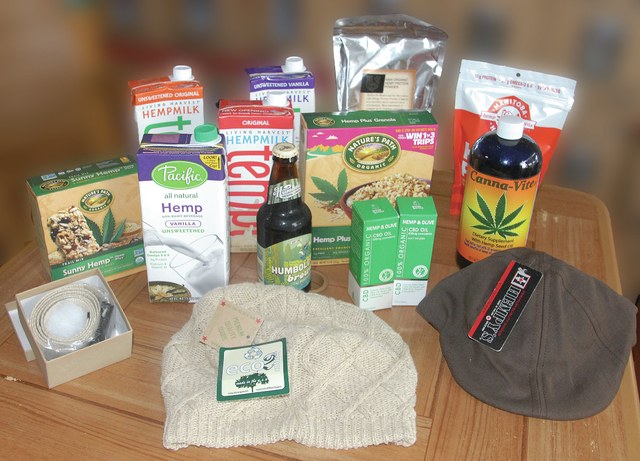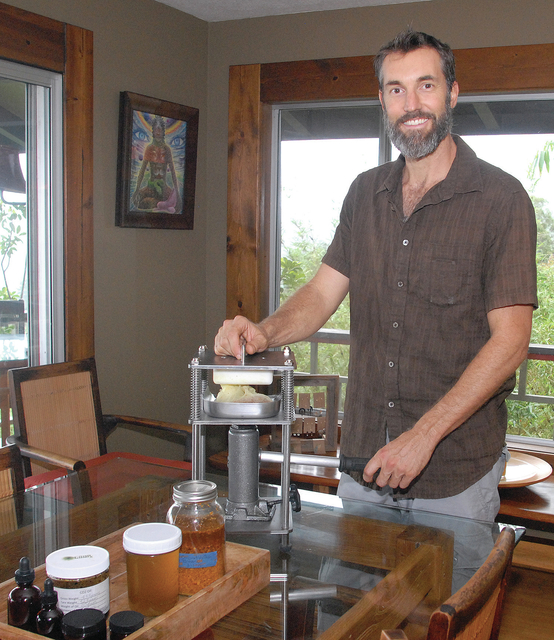KAILUA-KONA — Hawaii Island farmers in line for permits to begin experimental industrial hemp production say the crop could be a major boon for agriculture. ADVERTISING KAILUA-KONA — Hawaii Island farmers in line for permits to begin experimental industrial hemp
KAILUA-KONA — Hawaii Island farmers in line for permits to begin experimental industrial hemp production say the crop could be a major boon for agriculture.
Farmers who have fought for decades to cultivate the nondrug version of the plant for oil, seed, medicine and fiber will finally get their shot in the coming months. Following the passage of legislation this past session to set up pilot programs for hemp production, the state Department of Agriculture is preparing to request a streamlining of the process of bringing experimental hemp production on line.
“Hopefully by fall, some of the first growers will be able to start cropping,” Scott Enright, the department’s chairman, said.
Ka‘u vegetable farmer Greg Smith is working to identify strains of the plant that are suitably low in THC to qualify for industrial cultivation, and is in the early stages of planning a cooperative that could bring growers together and lead to the creation of a hub and processing center.
The potential markets in Asia and Japan for hemp-based medicine is huge, Smith said, and there are other industrial possibilities for a crop that could also help rebuild soils on former cane land.
“I believe Ka‘u would be ideal,” Smith said. “There is plenty of soil and a lot of small farmers struggling to find a crop they can make money on.”
“It’s exciting,” Smith said. “It’s never been done before here.”
There are a lot of details that have to be worked out first. Smith said the industry needs investors and to overcome the remaining public stigma associated with the plant.
“Hemp is the new stepchild of cannabis and it could easily be the next big thing once the drug classification is taken away,” Smith said. “It’s not a drug; it doesn’t get you high.”
The cultivation will require farmers to get licensed and coordinate with the state DOA. Enright said he will try to bring on emergency hires of staff to administer a temporary program overseeing production while a longer-range plan is being worked out.
At the normal pace of government, that process and setting up compliance agreements with growers could take two years.
The legislation to enact hemp pilot programs contains $425,000 for two staff positions and programming. A half dozen farmers have contacted Enright to express interest in hemp farming. He hopes to have compliance agreements in place with growers by late summer. Farmers must also open their cropland to local and federal inspections and allow institutes of higher education to access the crop. The inspections would be to assure that none of the crops exceed 0.3 percent THC, or tetrahydrocannabinol, the primary psychoactive ingredient in cannabis.
Enright said that former sugar cane land is a natural setting for the crop. Growing hemp for fiber takes large swathes of contiguous land such as would be required for corn or soy, but crops for seed oil could be grown in greenhouses, he said.
“I haven’t seen the economic analysis of fiber being produced on high-end real estate, which is what we have here,” Enright said. “Growing for oil and seed has been shown to be quite lucrative.”
Enright said he is aware of 23 other states cultivating hemp.
“That’s a pretty strong trend,” he said. “To the extent a crop is deemed legal and there is support in the community, the DOA will support it.”
While Smith pointed out that Hawaii’s climate would allow three crops in the time it takes to grow a single crop in colder climates on the mainland, he worried Hawaii will be left in the dust if it doesn’t take hemp seriously.
“Hopefully the state embraces the crop,” he said. “The longer we wait, people in states like Colorado and Oregon are going to monopolize it, and it’s going to make this harder.”
Hemp proponents and others have widely tout the potential benefits of CBD cannabinoids in treatment of such maladies as cancer, epilepsy, autism, post traumatic stress disorder and sleeplessness.
Steve Sakala, president of the Kona chapter of Hawaii Farmers Union United, believes the state is ideally situated to supply emerging middle classes on the Pacific Rim with medicinal products. The Kona HFUU, made up of some 50 growers, backed the legislation making the experimental farms possible.
The pilot programs are also backed by Maui agricultural interests looking to fill the void left by the closure of the state’s last sugar plantation announced by Alexander &Baldwin in January.
The negative stigma around cannabis “may be one of our biggest obstacles, but I think we’re going to get past it,” Sakala said.
Sakala is in the process of launching a CBD hemp oil line called HI CBD Organics, using oil imported from Colorado. The non-THC containing substance is legal in all 50 states, he said. His product, infused with Hawaii ingredients like turmeric and passion flower, could eventually be made entirely with ingredients grown locally.
It is not yet widely known that it is possible to make a living on a half acre of hemp grown for medicinal oil under a greenhouse, he said.
“Small-scale oil production has huge potential as an answer to our small-scale family farming on this island,” Sakala said. “Not only is it a great income potential for Hawaii, it has potential to move us to a more regenerative, organic and sustainable style of agriculture.”




